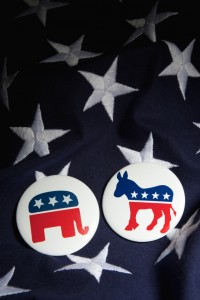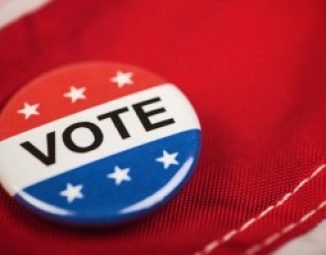Election Day Consideration: Legal Risks Associated with a Politically Contentious Workplace
This year voters go to the polls to elect governors in Virginia and New Jersey, mayors in New York City, Boston, Detroit and other municipalities, and decide on a host of ballot issues across the country. With all of the excitement of Election Day, employees are sure to be engaging in political discussions in the workplace. Although politeness dictates that like money and religion, politics is seldom a good candidate for casual conversation; a politically contentious work atmosphere can put employers at risk for claims of political affiliation discrimination or First Amendment violations.
Private Employers
Although federal law does not shield private employees from political affiliation discrimination, an increasing number of states have granted Title VII-style protections to non-governmental personnel. Private employers should be mindful that political affiliation-related measures may be hidden away in other statutory provisions—namely those concerning freedom of speech.
For example, California, the District of Columbia, Louisiana, New York, Puerto Rico, and the Virgin Islands explicitly outlaw political activity- or affiliation-based discrimination. In New York, it is unlawful for public and private employers alike to discriminate against individual employees on the basis of their “political activities, outside of working hours, off of the employer’s premises, and without the use of the employer’s equipment or other property, if such activities are legal . . . .” In this context, “political activities” means “running for public office; campaigning for a candidate for public office; or participating in fund-raising activities for the benefit of a candidate, political party, or political advocacy group.” The statute has been construed broadly—for example, protecting an electrician who was retaliated against for wearing a campaign sticker in support of his employer’s political opponent at work. Richardson v. City of Saratoga Springs, 246 A.D.2d 900 (N.Y. App. Div. 3d Dep’t 1998).
Other states, such as Colorado and North Dakota, protect participation in “any lawful activity” off the employer’s premises during nonworking hours, while Connecticut and South Carolina have broad free speech provisions that treat employee expression of political beliefs as a state constitutional right. Arizona, Mississippi, Pennsylvania, Tennessee, and Washington outlaw various measures of employer-based political coercion, such as placing paychecks in envelopes containing political mottos, devices, statements, or arguments designed to influence employees’ political actions or opinions (Arizona and Pennsylvania) or earmarking portions of employees’ salaries for contribution to employer-mandated political causes (Washington). It is important to note, however, that in many of these states, employee-prompted political speech and action remain largely unprotected.
Public Employers
The general rule is that public employees cannot be hired, fired, recalled, transferred, or subjected to any other adverse employment decision due to their political party identification or support for a specific candidate, unless they serve the government in a confidential or policymaking capacity. See Elrod v. Burns, 427 U.S. 347 (1976). In a line of cases brought by government employees who were fired or penalized because of their political association, the U.S. Supreme Court has held that there is no right to protection for political affiliation where political affiliation is legitimately relevant to the employee’s job. 
Courts have adopted a three-part test for determining whether a public employee has established a prima facie case of discrimination based upon political affiliation. Specifically, the employee must prove: (1) that the employee works for a public agency in a position that does not require a political affiliation, (2) that the employee maintained an affiliation with a political party; and (3) that the employee’s political affiliation was a substantial or motivating factor in the adverse employment decision. It is well-established that subjective “feelings” and speculation are insufficient to support a first amendment political affiliation discrimination claim. Adverse employment decisions stemming from interpersonal “office politics,” but not the product of “government, public policy, or public controversies” will not satisfy the causation prong.
Further, public employers may be at risk for First Amendment retaliation claims based on adverse actions resulting from an employee’s political affiliations. Actionable retaliation for the exercise of First Amendment rights requires an employee to establish that: (1) the conduct in which the employee engaged was constitutionally protected; and (2) it was a substantial or motivating factor for the alleged retaliatory conduct by the employer. The First Amendment protects speech by a government employee only when it relates to a matter of public concern. A public employee’s statement involves a matter of public concern if it can be fairly considered as relating to any matter of political, social or other concern to the community. In the employment context, the important distinction to be made regarding constitutional protection is between speech related to personal interests and speech related to matters of importance to the community.
For example, in Bland v. Roberts, 730 F.3d 368 (4th Cir. 2013), the court held that two former sheriff’s department employees who lost their jobs because they expressed support for a rival candidate on his Facebook campaign page could bring First Amendment retaliation claims. Specifically, the court held that the employees’ support for the opposition via Facebook postings constituted protected political speech. The court explained:
In sum, liking a political candidate’s campaign page communicates the user’s approval of the candidate and supports the campaign by associating the user with it. In this way, it is the Internet equivalent of displaying a political sign in one’s front yard, which the Supreme Court has held is substantive speech. See City of Ladue v. Gilleo, 512 U.S. 43, 54-56, 114 S. Ct. 2038, 129 L. Ed. 2d 36 (1994). Just as [the employee’s] placing an “Adams for Sheriff” sign in his front yard would have conveyed to those passing his home that he supported Adams’s campaign, [the employee’s] liking Adams’s Campaign Page conveyed that message to those viewing his profile or the Campaign Page.
In Jewell v. Shelby County Gov’t, 2013 U.S. Dist. LEXIS 134755 (W.D. Tenn. Sept. 20, 2013), the court held that a deputy sheriff in the Shelby County Sheriff’s Office who suffered adverse employment actions after he opposed a chief deputy’s campaign for sheriff could advance his free speech retaliation claim against the county. Specifically, a lieutenant in the employee’s unit who supported the chief deputy for the sheriff position grabbed the employee around the neck, threw him against a wall, and told him that he “better vote Republican in the primary.” The court ruled that the employee plausibly alleged free speech retaliation under the First Amendment because the employee was transferred, received poor performance evaluations, was relieved of duty and was required to submit to a fitness for duty evaluation after opposing the chief deputy’s campaign and filing a complaint that his campaign violated the Hatch Act.
Additionally, public employers may be at risk for freedom of association claims for adverse actions which result from an employee’s political activities. For example, in Allred v. City of Carbon Hill, 2013 U.S. Dist. LEXIS 144570 (N.D. Ala. Oct. 7, 2013), the court held that a former police chief could advance his constitutional freedom of association claim against the city and its mayor for firing him for supporting his wife’s candidacy for mayor.
*The author would like to acknowledge Alexander Batoff for providing assistance with the research and writing of this article.



